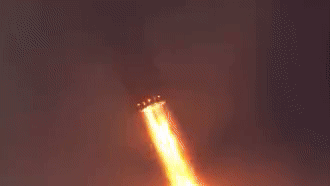
Instagrammer and astrophotography extraordinaire, Andrew McCarthy (aka @cosmic_background) has released what has to be my favorite Instagram Reel of the week. Even ahead of all those cute and funny dog videos that seem to dominate my news feed…
The Reel in question depicts the historic launch of SpaceX Starship flight test 5, which launched on October 13 and will be immortalized in the annals of history as being the first booster 'caught' upon its return to Earth. Andrew's video, which you can see below, provides an unprecedented view of the proceedings.
He rented a $17,000 lens to capture the event from a whopping 5 miles away, tracking the starship's flight as it reached an altitude of up to 50 miles. But more impressive is the fact that he states: "Each frame of video is hand tracked and hand stabilized."
The video depicts the starship blasting off from the launch pad, punching through the Earth's atmosphere, the Super Heavy booster detaching, its boosters firing to slow its descent back down to Earth, and finally the historic launchpad capture.
The historic 'catch' is almost obscured by a person jumping in front of the camera – presumably with elation – in what would have been an utter tragedy. Thankfully, Andrew kept a cool head, managed not to panic and captured the climactic moment anyway.
At one point during the video, the astrophotographer confesses to adding in more cuts as the booster detaches, due to difficulties tracking. But from my perspective, the entire video is nothing short of jaw-dropping.
If that wasn't enough, Andrew has also posted an equally impressive composite photo, depicting every major stage of the launch. All told, it's a mega 280MP image and is available to order via the link in his Instagram bio. Alternatively, he also has plenty of equally stellar prints on his website.
If you're an astrophotography enthusiast, make sure you keep tabs on what to shoot via our Astrophotography in October guide. I've also posted a guide explaining how you can get a photo of Comet Tsuchinshan-ATLAS tonight before it disappears for 80,000 years.
For more galactic goodies, check out the best camera for astrophotography and the best star tracker camera mounts.







